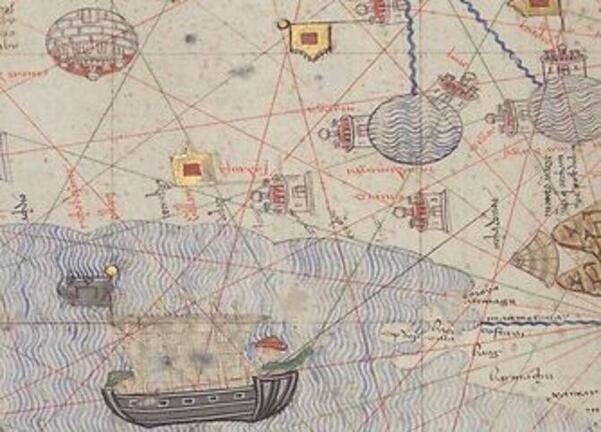
Detail from Abraham Cresques, Atlas de cartes marines (c. 1375), from Gallica.
Identity Abroad in Europe and the Mediterranean, 11th-15th centuries
7-8 January 2022
Teresa Barucci (University of Cambridge)
Susannah Bain (University of Oxford)
Life in the central and late Middle Ages was characterised by high levels of mobility and migration. In Europe and the Mediterranean region, shifts in political, socio-economic, cultural and religious life encouraged and sometimes forced individuals and groups to move ‘abroad’ temporarily or permanently. Young men travelled from as far as Constantinople and Turku to study theology at the University of Paris, while in 1240 twenty thousand Sicilian Muslims were relocated to Lucera by Emperor Frederick II. These people, who often spoke different languages and had different political allegiances, socio-economic backgrounds, cultures, and faiths, found themselves in contact with other ‘foreigners’ as well as with local residents and institutions.
Medievalists have studied ‘foreigners’ from many perspectives. Their impact on the movement of ideas and artistic practices and their role in urban conflict have been particularly popular topics of discussion. Most recently, Miri Rubin’s Cities of Strangers, based on the 2017 Wiles lectures, considered the relationship between ‘strangers’ and urban institutions, showing how the latter became progressively less tolerant starting from the mid-fourteenth century. What is less well explored, however, is how these individuals and groups understood and (re)presented themselves. How did they construct their identities? Did the factors they considered important change with circumstances and over time, and why? What means were used for identity expression? How was their self-identification and presentation received by other ‘foreigners’ and locals living alongside them? Lastly, how do ongoing debates around the concept of ‘identity’ speak to this kind of historical research? Although these questions are often addressed as part of broader discussions, they are rarely dealt with in their own right.
Identity Abroad in Europe and the Mediterranean, 11th-15th centuries aims at exploring the construction, expression, and practical significance of various forms of ‘identity’ among those people who chose or were forced to live ‘abroad’ at least temporarily in Europe and the Mediterranean in the period between the eleventh and the fifteenth century.
Looking at ‘identity’ from within the lens of any single discipline is reductive: the theme is an inherently interdisciplinary one. By including contributions which utilise a diverse range of sources, approaches, and methodologies, and which relate to a wide geographical area and chronological span, the conference seeks to offer a multiplicity of perspectives on its theme as well as to foster discussions and working relationships among its speakers and attendees.
Confirmed Speakers:
Professor Miri Rubin (Queen Mary University, London)
Professor Roser Salicrú i Lluch (Institució Milà i Fontanals, Consell Superior d’Investigacions Científiques, Institut d’Estudis Catalans)
Professor Teresa Shawcross (Princeton University)
We invite proposals for 20-minute papers from graduate and early career researchers working across all relevant disciplines in the Humanities and Social Sciences. By bringing together a variety of different perspectives, the conference not only aims to consider how ‘identity abroad’ functioned in specific contexts, but also to emphasise developments, patterns, and divergences. Topics of interest include, but are not limited to:
- Individuals and groups living ‘abroad’, such as merchants, artisans, pilgrims, scholars, diplomats, soldiers, exiles, ethnic and religious minorities, and captives and enslaved people
- Voluntary or forced, temporary or permanent migration
- Importance of political allegiance, language, cultural heritage, and faith in identity construction
- Means of identity expression, such as written production and material culture
- Relations between different ‘foreign’ individuals and groups
- Interaction and assimilation/resistance to assimilation with ‘local’ populations, institutions, and rulers
- Impact of gender, socio-economic background, and other types of differences
- Theoretical treatments of the concepts of ‘identity’, ‘foreignness’, and ‘abroad’ in the Middle Ages
Abstracts of 250 words and a short biographical note should be sent to identityabroad22@gmail.com by 12 September 2021. For more information, visit https://identityabroad22.crassh.cam.ac.uk/ and follow @identityabroad on Twitter.


![]()


